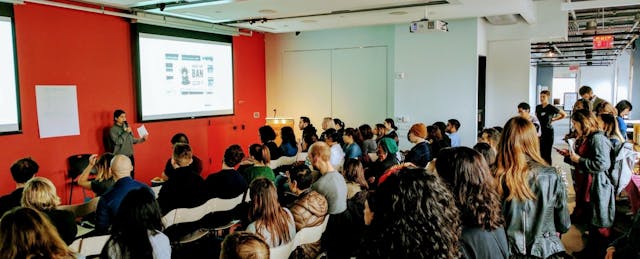Educators, nonprofits, lawyers, students and technologists gathered at New York University’s engineering and design school on Saturday for a civics-oriented hackathon. Working with nonprofit organizations like CUNY CLEAR and the Center For Constitutional Rights, the teams developed apps, synthesized data, and designed graphics to support the organizations’ efforts educating immigrants and protecting minority rights in an event titled, “Hack the Ban.”
“It was kind of insane. We organized this independently and completely sold out of all our tickets in the span of a week,” says Sriya Sarkar, one of the three organizers. She and two fellow NYU alumni, Leslie Martinez and Helen Carey, put the event together in under a month. “We all have full-time jobs so being able to do this on our free time was the hardest for us. None of us had organized a hackathon before, but now is not the time to sit back and observe,” Sarkar says.
During the event, organizations working on immigrants rights in the city pitched their needs to the crowd of about 60 people. Some sought help with social media campaigns and graphics while others wanted more complex web and data security upgrades. From 9:00 am to 9:00 pm the teams spread across the floor brainstorming ideas and executing plans to enhance their digital capabilities. “The goal is to get a solution working by the end of the day,” says Sarkar, “so once everyone goes back to work, nonprofits should be able to hit the ground running.”

For many of the technologists in the room, the immigration orders passed by President Trump’s administration has become a personal issue. “I just became a citizen two weeks ago. I felt violated and betrayed by the results of the election both as an immigrant and as a woman. Every time I say this I get a little choked up,” Federica Bianco pauses, “I took an oath to defend the Constitution and its values, and this is what I am doing.”
Bianco is an astrophysicist by trade and works as an educator at NYU’s Center for Urban Sciences. When I spoke with her, she was working on a data visualization project for the Arab American Family Support Center (AAFSC). The project aims to take census data regarding languages spoken at home and make it visual so that the AAFSC could track urbanization patterns of Arab-speaking households and reach out to those communities with goods and services. “The population density of these communities are hard to find because in the official census they are not a distinct ethnicity or race, so while you can find Hispanic communities and target those areas, you cannot locate predominantly Arab areas because they are listed as Caucasian,” says Bianco. She hopes to create a timeline visualization of migration patterns with language data from several years that the AAFSC can update regularly.

“I was a graphic designer, but I left my full-time job to pursue artmaking. The change just happened to coincide with this hell hole that has opened up,” says Fei Lou, a freelance digital product design manager. “I have a lot of Iranian friends, one of them is an artist, and she felt as if she was stuck abroad,” says Lou. She spent the day designing slogan images for the Center for Constitutional Rights. The organization has been in New York City for over 50 years. It is comprised of lawyers and activist who represent immigrants and other minority groups.
Aliya Hussain, one of the program managers for the Center for Constitutional Rights who just returned from Guantanamo Bay explained: “We are always looking for ways to make our work more accessible for people who are impacted and the general public.” For Hussian, telling the stories in as many mediums as possible is critical to mobilization. She hopes that graphics created at this event can help those who don’t know English to understand their rights.
“Showing the human impact of these policies is what I believe encourages people to take action, and we see that at this moment,” Hussain says.


